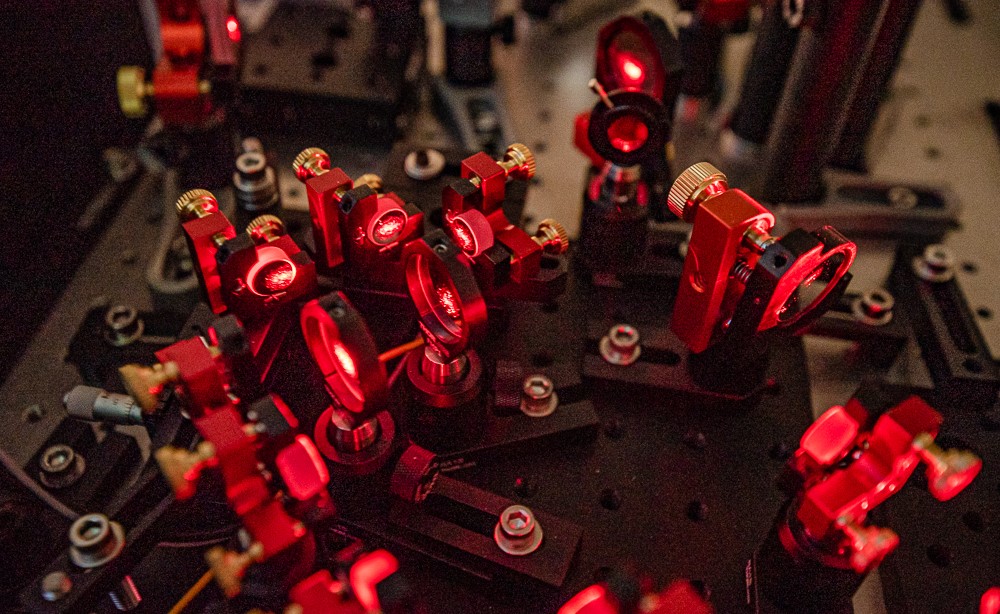Prof. Michael Krueger joined Technion’s Faculty of Physics and the Solid State Institute in 2019, with the goal of pursuing pioneering research on nanostructures with unprecedented resolution in time and space. Specifically, Prof. Krueger and his group are developing a new kind of microscope that, if successful, could revolutionize quantum dynamics.
Prof. Krueger is especially grateful for the support he has received from the Helen Diller Quantum Center. “The Quantum Center supports us a lot with funds for the new lab. It would not have been possible without them. Moreover, the Quantum Center encourages us to come up with unconventional ideas together with other quantum scientists here at the Technion and to take risks.”
The new microscope will be able to observe electron motion in all kinds of different systems both with attosecond time resolution and Ångström spatial resolution. An attosecond is 1×10⁻¹⁸ of a second and it is the natural timescale of electron motion and dynamics. For context, an attosecond is to a second what a second is to the age of the universe. An Ångström is a tenth of a billionth of a meter. “We want to see what’s happening in space with the motion dynamics of electrons. In order to watch what electrons are doing in atoms or molecules or nanostructures, we need to study them at the attosecond timescale.”
Since modern electronics is one million times too slow to actually see something on the attosecond timescale, Prof. Krueger uses extremely short laser pulses, which can easily be made as short as a few hundred attoseconds. These light pulses excite the electrons, making it possible to measure what takes place at these tiny timescales. The generation of these light pulses was made possible using a chirped pulse amplification technique invented by recent Nobel Prize winners Donna Strickland and Gérard Mourou.
Prof. Krueger anticipates groundbreaking applications for the microscope he is designing, such as seeing the quantum wave function that is associated with electrons and observing quantum dynamics in space and time in these very short time and length scales. “We are looking for quantum many-body dynamics. We want to see experimentally effects that were predicted by theorists, but have eluded experimental observations up to now.”
Despite the additional challenges of Covid-19, Prof. Krueger hopes that his lab will be ready by April 2021. In the meantime, his group has been allocated space in Prof. Ido Kaminer’s lab. Aside from Krueger, the group consists of Ph.D. student Boyang Ma and lab engineer Shimon Cohen along with three Master’s students. If all goes according to schedule, the microscope should be completed by the end of 2021.
A combination of unconventional decisions and luck brought Michael Krueger to Israel and to Technion. Having grown up in Germany, he completed all his academic degrees at the Ludwig Maximilian University in Munich and conducted research at the Max Planck Institute of Quantum Optics. Following his Ph.D. summa cum laude in Physics, Michael decided to pursue a postdoc in Israel. “As a Christian, I found the Holy Land intriguing,” he notes. In 2014 he joined the Weizmann Institute’s Department of Physics of Complex Systems, as a postdoctoral researcher and later as a senior postdoc fellow.
Prof. Krueger has received many prizes and grants including, recently, a European Research Council Starting Grant, an Israel Science Foundation Personal Grant, and the Feinberg Graduate School Award for outstanding achievements in postdoctoral research. He has also published articles in such prestigious journals as Nature, Nature Photonics and Nature Physics.
During his postdoc, Krueger met his future wife, a new immigrant from the U.S., and decided to remain in Israel. Although his Hebrew is quite good, for now, he is still more comfortable teaching in English. He and his wife live in faculty housing on the Technion campus. “I miss Germany, but I am committed to Israel and to Technion. I am looking to be rooted here.” (Rebecca Kopans)
Grants:
• ERC starting grant, project ATTIDA (2020-2024)
• ISF personal grant and new faculty equipment grants (2020-2023)
• Nevet grant of the Helen Diller Quantum Center (together with Prof. Yehonadav Bekenstein)
for more information regarding Prof. Krueger's lab

